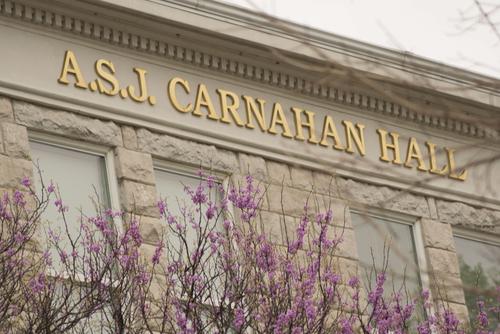Master's in Public History
Continue to main contentMaster's in Public History Outcomes & Careers
-
$78K
Historian
According to the Bureau of Labor Statistics, the mean annual salary for historians is $78,470.
-
$71K
Anthropologists & Archeologists
According to the Bureau of Labor Statistics, the mean annual salary for anthropologists and archaeologists is $71,070.
-
$60k
Curator
According to the Bureau of Labor Statistics, the mean annual salary for a curator is $60,380.
-
$59k
Archivist
According to the Bureau of Labor Statistics, the mean annual salary for an archivist is $58,640.
With a master’s degree in Public History, complete a minimum of 36 credit hours. There are two options available: Digital Heritage and Historic Preservation.
- Undergraduate GPA of 2.75 or higher on a 4.0 scale.
- A letter of intent which indicates how the applicant’s past experiences have prepared them for a graduate degree in Public History and to succeed at the graduate level.
- An academic or professional writing sample
Provisional and Probationary Admission
An applicant lacking any of the above requirements may, under certain circumstances, be admitted provisionally or on probation.36 Hours Required
Required Courses:
- GH600 Introduction to Public History (3)
- GH610 Methods of Research in History (3)
- US635 American Material Culture (3)
- GH695-697 Thesis (6)
- HP640 Internship (3)
- HP645 Advanced Project in Applied History (3)
- GR698 Master's Final Comprehensive Examination (0)
Choose One of the Following Options:
DIGITAL HERITAGE OPTION
- GG563 Advanced Topics in Geography (3)
- GH550 Heritage Outreach (3)
- HP575 Collections Management (3)
Choose one 12 hour track:
Computer Science track – 12 hours
- CS500 Fundamentals of Programming (3)
- CS533 Mobile Computing (3)
- CS630 Current Topics in Human Computer Interaction (3)
- 3 hours of departmentally approved electives (3)
Educational Technology track – 12 hours
- SE600 Multimedia in Education (3)
- SE617 Foundations of Educational Technology (3)
- SE683 Instructional Design and Technology (3)
- 3 hours of departmentally approved electives (3)
Multidisciplinary track – 12 hours
- Select 3-9 hours from list of approved CS prefix or SE prefix courses
- Select 3-9 hours from list of departmentally approved electives
Departmentally Approved Electives:
- GH520 Techniques of Oral History (3)
- GH550 Heritage Outreach (3)
- HP525 Living History (3)
- HP540 Topics in Historic Preservation (3)
- HP552 Historic Preservation Field School (3)
- HP575 Collections Management (3)
- HP580 History of American Building Materials and Techniques (3)
- HP585 History of American Architecture (3)
- HP588 Legal and Economic Principles of Historic Preservation (3)
- HP589 Hist Preservation Based Econ Revitalization (3)
- HP630 Issues in HP: Archives, Museums, Hist Site Admin (3)
- HP640 Internship (3)
- HP645 Advanced Project in Applied History (3)
- HP650 Problems in Historic Preservation (3)
- EH620/US620/WH630 Seminar in History (3)
HISTORIC PRESERVATION OPTION
- HP585 History of American Architecture (3)
- HP588 Legal and Economic Principles of Historic Preservation (3)
- EH620/US620/WH630 Seminar in History (3)
- Choose 12 hours from departmentally approved electives:
Departmentally Approved Electives:
- GH520 Techniques of Oral History (3)
- GH550 Heritage Outreach (3)
- HP525 Living History (3)
- HP540 Topics in Historic Preservation (3)
- HP552 Historic Preservation Field School (3)
- HP575 Collections Management (3)
- HP580 History of American Building Materials and Techniques (3)
- HP589 Hist Preservation Based Econ Revitalization (3)
- HP630 Issues in HP: Archives, Museums, Hist Site Admin (3)
- HP640 Internship (3)
- HP645 Advanced Project in Applied History (3)
- HP650 Problems in Historic Preservation (3)
- EH620/US620/WH630 Seminar in History (3)
Graduate Assistantships
The graduate assistantship (GA) is designed to provide support during full-time graduate study. It’s an opportunity for the graduate students to serve in a professional role while establishing a professional relationship with faculty and administrators. In addition to a per year stipend, GAs gain valuable experience. There are two kinds of assistantships: teaching and administrative.
What will it cost?
College of Humanities and Social Sciences
This degree is housed within the College of Humanities and Social Sciences. The College prepares students for lifelong careers. We boast programs that train students in problem-solving, critical thinking, communication, organization, and adaptability. Skills employers value, so we prepare you for basically any career field.
Become a Redhawk.
Do more than dream about the future. Take the first steps to make it all happen.
“ I definitely think that SEMO has some of the best history professors around. The pure knowledge that they have of any given topic is just out of this world! If you're interested in historic preservation, SEMO is the place to go. ”
Graduate Coordinators
Graduate coordinators serve as the contact for graduate programs. The coordinators are most often faculty within the college that houses the program, helping you to get questions answered and first-hand knowledge of the degree requirements and placement opportunities.
Getting the Job
Your education is just one piece to launching an extraordinary career. Once you’ve mastered the material, you still have to find the job you want, make the right connections, and sell your knowledge and experience—if all this is giving you anxiety, don’t panic. SEMO’s Career Services office is here to help you with the next step. Our boldly supportive faculty will provide the expertise and support you need, so you’re landing your dream job in no time.
Cape Girardeau, Missouri 63701

